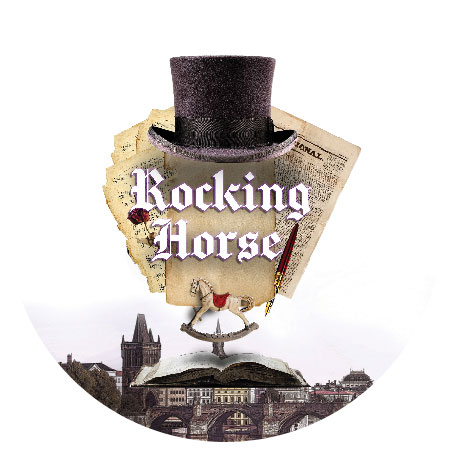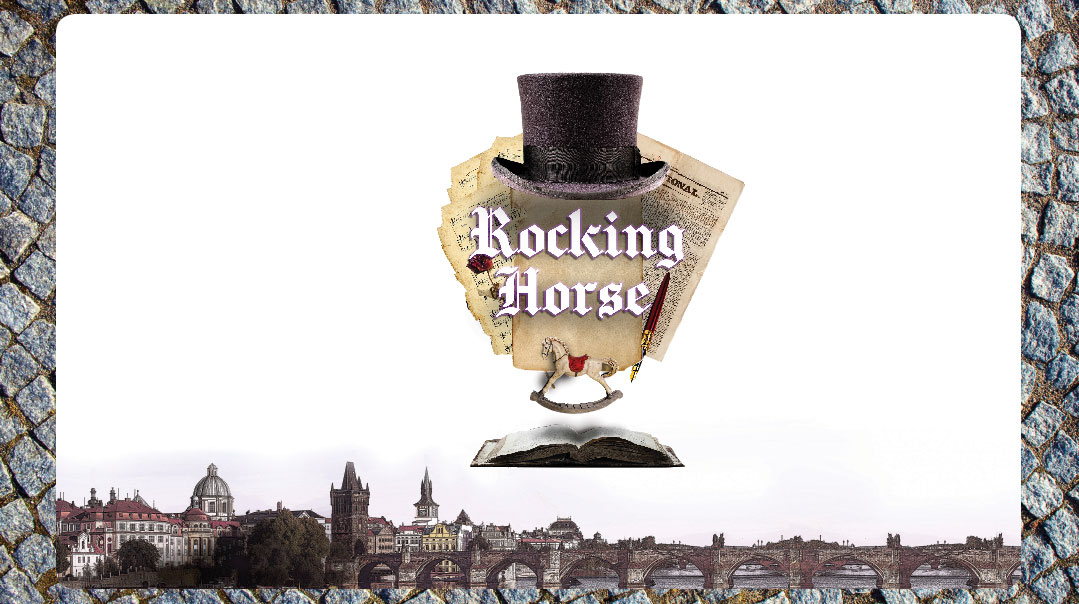Rocking Horse: Chapter 20

What is better, bitterness or innocence? Emptiness or the wisdom that comes with facing the darkness?
H

annah swallows her anxiety as she faces the little wooden door, deep in the old Jewish ghetto. Even the snow is gray here, trodden on by muddy boots — and sometimes, dirty feet — and there’s the smell of frying onions, which should be a good smell, a Shabbos smell, but somehow it makes something acidic rise at the back of her throat.
She hesitates. This is it. The address Sarah has given her.
The wooden carton of food is heavy in her hand, and she hesitates, unsure of whether to put it down on the slushy cobblestones or to prop it against her leg in a most unladylike fashion to free a hand so she can knock on the door.
She is still deliberating when the door flies open. Hannah startles, gripping the carton.
“Loyf! Loyf fun du, moyz!”
A young woman, brandishing a broom.
A little boy, wailing.
And a brown flash over her black boots, running, disappearing, a tail whisking behind it. A mouse.
The woman looks at Hannah and blinks.
The little boy grabs his mother’s hand and pulls, hard. “You made it run. Bad mama, bad mama, you made it run.”
The woman swings the boy up onto her hips. She has a large, pregnant stomach and Hannah wants to chide her, Careful, careful of yourself and your unborn baby. Don’t just swing him up on you like that.
Instead, she turns and searches the alleyway. The mouse has disappeared.
“All gone now, Mama, all gone.” The boy wails.
The woman stares at her. “Do you want something?”
Hannah looks at the little boy. “Did you like the mouse?” she asks. “Did you like to play with it?”
The woman gives her a look, half curiosity, half ferocity. “Are you not a fine lady, then?”
A mouse. A boy. A young woman, rich Yiddish, pale complexion, brown headscarf, heart-shaped face, and a strength that she likes. She laughs, suddenly, and it feels good. “You could say that.”
“A lady would scream.”
“Well it’s clear then, I am not a lady. Now that that has been established, can I ask you if I can come in. This—” she indicates the crate “is heavy.”
The room is dark and small. A single bed has been pulled next to the fireplace for warmth. In the grate, a small fire flickers. She looks around. There isn’t much here. The community, it seems, is not hugely generous in its provisions.
Hannah is about to put the crate of food on the floor, but thinks of the mouse, and slides it, instead, onto the small wooden table. She points. “Challos. Fish. Chicken. Kigel.”
The woman’s face lights up, then shutters again.
“Kosher. Glatt. As you said, I’m no fine lady. I’m a shtetl girl. You can trust our kashrus.”
The woman lets out a long sigh of relief and sinks into a chair. “I’ve been fighting that mouse all morning. Leib’l isn’t very happy though. I think he might have been playing with it for days.”
Hannah picks up a piece of coal from next to the fire, and reaches into her coat. A visiting card is there, slightly bent. She hands them both to the little boy. “Do you like to draw?” He nods. “When I was a little girl, I used to draw with a stick in the garden. But you can draw with a coal, too.”
He takes the lump of coal. It is almost too big for his little hands. He crouches on the floor, and draws a line through her name. Frau H. Schwebel is obliterated instantly. For some perverse reason it makes her laugh.
He looks up at her, then calls out to his mother. “Mama, vos iz es? Iz es a goy?”
The woman shakes her head. “Nein, yingel. Ich bin a Yid vei ir.”
If she were this woman, she’d be blushing. But instead, the woman regards her coolly, as a specimen of sorts. A woman who may be mistaken for a goy but who speaks Yiddish and comes bearing kugel for Shabbos.
“I’m Chanalle. Hannah. Welcome to Prague.”
Chanalle. The word seems to do its magic. “Chasya,” the woman says.
The little boy looks up at them. “And I am Leib’le.”
Leib’le sits too close to the fire, and she wants to call him away, but it is not her home, this is not her daughter, this little boy is not her son — or her grandson. Now he has pulled up his trouser leg and is coloring on his skin. Chasya sits and rests her hands on her stomach. She is slightly breathless and in the dim light, Hannah peers down. According to Sarah, the woman is close to giving birth. Either she is carrying small, or she has not had enough food for a while.
“I know that some of us in Prague look different, but we’re also frommer Yidden.” It is not necessary to get into the nuances.
Chasya’s thin, pale hand brushes her headscarf. Their eyes meet for a second, and she seems to soften.
Hannah crouches down on the floor. “Hello, Leib’le. Next time I come, should I bring you a pencil and some paper?”
He looks at his mother, as if asking permission. Chasya hesitates. Then she gives a slight nod.
“Will you bring it tomorrow?”
She laughs, wants to stroke his cheeks, this little boy who suddenly reminds her of all the little boys she grew up with. Neighbors’ sons and cousins, each with wide, round eyes and an innocence that shone from their faces. Maybe Emmy is right after all. Maybe she is doing this for herself.
“Tomorrow is Shabbos, Leib’le. We don’t draw on Shabbos.”
“Tomorrow?” His eyebrows furrow. “Mama, is it going to be Shabbos?”
“Yes, of course.”
“And there will be challah and kigel?”
Hannah stands up. “Come and look.” He follows her to the small, wooden table. The food may be cold, but it is still fragrant, and when she opens the paper bag with the challos he seems to gulp down the smell. He looks at the loaves with wide eyes, lifts a hand, draws it close as if he wants to touch it and make sure it’s real. His hand is covered in coal dust.
“Leib’l,” Chasya says sharply. He snatches back his hand.
Hannah sits down opposite her. “How much longer until your confinement?”
She shrugs. “A week? A month? These months have been… I have lost track. When the right time comes, it will come.” She pauses, “I am only glad that we are here, settled, and not still on the road.”
It is the first time she has admitted some kind of need, and Hannah already feels less on her guard, more like she has a place there in the room.
“And your husband?”
Chasya looks away. “He has gone to his place.”
His place. His world. A euphemism. He is no longer among the living. He died on the journey, perhaps. Or maybe he was killed in a pogrom, and that is why she fled.
Chasya busies herself with her child. She bends down, wipes his hands with a damp cloth. “All clean, now.”
“I am sorry,” Hannah begins. She looks at the woman, at her swollen middle, at the little boy who will not remember his father and tears suddenly come.
Chasya holds up her hand, stopping some invisible enemy. “We are here and we are alive and that is all that matters. And Leib’l here is very excited to see the famous clock of Prague.”
So she is tough. Of course she is. Hannah is reminded of the brittleness born in the shtetl, the afterbirth of survival.
Prague’s astronomical clock features a skeleton, the specter of death. That is the luxury of Prague. They can ogle at mortality from a safe distance, pretend it belongs to a clock, instead of to every second of a person’s life. The hourglass that lives in each of us, that is studiously ignored. In the shtetl, it can be broken, in you, in the one you love, leaving behind the chaos of shattered glass and coarse sand.
“Yes, the Oloj is quite the sight. Maybe my son could take him.”
“Perhaps.”
Hannah is suddenly uncomfortable. “How old are you?”
“Oh, I am not as young as I look.”
“Try me.”
“I am almost 20.”
Almost 20. A year older than Emmy.
What is better, bitterness or innocence? Emptiness or the wisdom that comes with facing the darkness? Would she prefer that her daughter were like Chasya, with a shield, a breastplate, a helmet that come from unspeakable nightmares, that come along with learning to survive? With a shiver, she is reminded of what could have been, of the knowledge, both guarded and hated, that lives inside the young girls from the shtetl.
They are more innocent, but their existence is harsher. Money pampers. Status protects. For a second, she can identify with the von Albrechts and families like them. They have been burned for generations. If they finally have it good, they will do everything to protect that.
Hannah pushes back her chair, to leave this place, to leave these thoughts. “I shall come again on Sunday, if I may. And bring this little one a pencil and paper. And if your time comes, then send someone to fetch me. Hannah Schwebel. We’re not too far away from here.”
Chasya suddenly takes both her hands in her own. “I thank you,” she says. “A guten Shabbos.”
*****
Wolf Paschele should grow a beard. It would soften his indignation. “Two unicorns? A talking moon? A friendly demon? Where in the world did you get this from?”
Felix shrugs, and hopes that his face isn’t scarlet.
“What strange goings-on.”
“I thought the children would like it.”
Wolf gives a bemused chuckle. “Well, it’s certainly different.” He sniffs. “What’s wrong with, Hans and Bertha clean the Chanukah menorah? Or, Hans and Bertha visit their grandparents on their farm? Throw in a few cows, an early morning milking, a spilled bucket, that sort of thing.”
Wolf throws down the four pages Felix painstakingly typed in the printer’s shop, over the last couple of days, index finger hovering over the keys while he located each one: o… n… c… e once upon a time.
Painful business, this typewriter.
“Besides, where’s the moral?”
“The moral?”
Paschele leans forward and gives an exaggerated nod. “Yes, Mr. Parrot. Every story needs to have a moral. Otherwise, it’s worthless. Just a flight into fantasy. Didn’t your mother ever teach you that?”
“No sir. Actually, her stories were mostly flights into fantasy.”
“Waste of time, then. Filling children’s heads with twaddle. Dross.”
“I don’t—”
“Frankly, it matters not whether or not you agree. And what matters even less than that, in case you were about to argue it out, is whether there is objective proof one way or another. What matters is what sells the paper.
“Parents want to see their children reading something with a moral. And which moral do they want to see most of all? A good child is an obedient child.” He gets up, catches his hands behind his back, and begins to pace the room. “Now, I really don’t care how you get that message across. You can put Hans and Bertha in a boat on the river or in Charles castle or in the synagogue or wherever. As long as, by the end of the story, they’ve learned to listen to authority.”
Felix feels his cheeks turn red.
“And you can start by modeling that.”
(Originally featured in Family First, Issue 689)
Oops! We could not locate your form.

